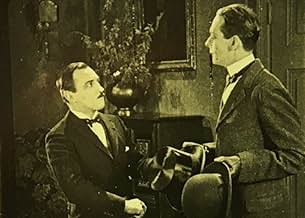Füge eine Handlung in deiner Sprache hinzuAfer having been stood up at his own wedding, a young man vows that he will have nothing more to ever do with women. However, he soon discovers that he has been left a fortune--on condition ... Alles lesenAfer having been stood up at his own wedding, a young man vows that he will have nothing more to ever do with women. However, he soon discovers that he has been left a fortune--on condition that he gets married. Deciding that being rich and married would be preferable to being br... Alles lesenAfer having been stood up at his own wedding, a young man vows that he will have nothing more to ever do with women. However, he soon discovers that he has been left a fortune--on condition that he gets married. Deciding that being rich and married would be preferable to being broke and single, he goes in search of a wife, but things don't turn out quite the way he pl... Alles lesen
- Auszeichnungen
- 2 wins total
Empfohlene Bewertungen
Griffith was known as the "Silk Hat Comedian," though here he only dons it for the scenes where, appropriately, he is getting married (for the rest his is dressed nattily but in street clothes). This comedy is an out-and-out farce, with a plot that is humorously convoluted (Raymond has been stood up at the altar, so he renounces women just before he finds out that he has been left a fortune on the condition that he marry; he nonetheless goes abroad in search of escape from women, but ends up in the same town as his arranged bride), but develops smoothly and with great comic timing. It revels unashamedly in impossible coincidences, and laughs are drawn deliberately out of our reactions to one unlikely development after another. The "night club" of the title -- which apparently is a particular society allowing only confirmed bachelors -- is oddly mentioned in only one title card and then dropped; perhaps there existed more complete prints of this film that brought it in more.
A big part of Griffith's success in comedy seems to come from his natural expressiveness as an actor; he can do a huge amount with his face and body and play it in a serio-comic way that works perfectly for this kind of story. Even with all the complications, the plot proceeds in a clear line with a protagonist we can follow. That allows the broader gags (dozens of girls emerge into the hall as Raymond calls for his butler Gerley) to be all the funnier as they are integrated in seamlessly.
As much of "Paths to Paradise" revolved around variations on two people trying to steal the same jewels, much of the best comedy here derives from a hilarious black-comedy sequences in which Griffith, who now must convince his new love that he does not really want her only for the money he could inherit, makes several vain attempts to kill himself, each of which ends in the girl deriding it as a foolish ploy for attention. There's a wonderful escalating brilliance to the series of gags in which he is constantly foiled in his suicide attempts -- pulling down the chandelier in an attempted hanging, and ending up an another woman's arms in front of the girl he wants as he tried to make a bandit jealous enough to murder him.
By some miraculous quality, this film manages to retain a certain kind of deadpan believability even as it turns on some totally unbelievable points -- Griffith somehow sells credibly his quick decisions to renounce women, to un-renounce them, to kill himself, and not to kill himself -- and the humor and involvement come not just from the story and gags but from investment in character and his earnest, offbeat, desperate, and ever-polite attempts to extricate himself from his predicaments. A running gag where new developments cause Raymond continually to order his butler to move his things in and out of his hotel in preparation for moving or staying is highly funny and used just enough to keep it that way rather making it repetitious.
Griffith seems to have been able to impart that same deliberate emphasis and comic timing here to what could have been an unrestrained farce as to what could have been an average caper film. It's hilarious, and plays madcap events in an otherwise low-key way for a memorable effect. It takes what could have been countless unbelievable events and character choices and makes them acceptable while at the same time reveling in their exaggerated unlikeliness. I'm looking forward to seeing what more I can of Raymond Griffith's comedies, and more disappointed than before at the number of them which are presumed lost.
With his round eyes and moustache, Raymond Griffith somewhat resembles Jerry Colonna as he nimbly bounds through this yarn set in an unspecified Latin American country, where he find himself pursued with deadly intent by local bandit Wallace Beery on a bicycle.
Both Vera Reynolds and Louise Fazenda are robust ladies about the same height as Griffith himself; the latter unusually and enjoyably sexy & Amazonian as Beery's passionate Latin mistress who likes it when Griffith treats her rough.
Wusstest du schon
- WissenswertesFollowing the successful telecasts of Othello (1922) and Der Adler (1925), New York City's freshly launched WJZ (Channel 7), began a weekly series of Sunday evening silent film feature presentations, shown more or less in their entirety, which aired intermittently for the next twelve months. This feature was initially broadcast Sunday 31 October 1948; the following week's selection would be Dancing Mothers (1926).
- VerbindungenVersion of After Five (1915)
Top-Auswahl
Details
- Laufzeit1 Stunde
- Sound-Mix
- Seitenverhältnis
- 1.33 : 1
Zu dieser Seite beitragen



























